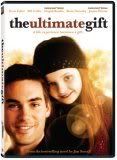
October 5, 2007
The Ultimate Gift (2006)
Should I see it?
Yes.
Yes.
Short Review: This film has moments that are sappier than a thousand-year-old maple tree paper mached with Hallmark cards.
If you can handle sentimentality and don’t mind a meandering plot, you will probably enjoy this film. The film tells the tale of belligerent rich kid Jason (Drew Fuller) who is sent on a series of tasks laid out in his grandfather’s will. If Jason passes these tests he will receive “the ultimate gift” which is expected to be a large sum of money. It doesn’t take a genius to guess that the tests are character-building activities and the big gift at the end isn’t about money at all. This is an obvious piece with plain intentions and no surprises. This said, it is also a well done piece with some good performances and a likable narrative.
The story does takes an unfortunate detour in the final hour by inserting a side step into a hostage situation for no reason. This distraction threatens to destroy the momentum built previously to these scenes. The hostage tangent doesn’t last long thankfully and the plot does manage to find its footing. This distraction however does enough damage to be pointed out as a serious mistake. Even if this is a part of the original book on which this film is based, it doesn’t fit in the film and should have been excluded.
The production itself has all the markings of a “Christian film”, low budget, the name actors are ones not working in the prime of the careers, and a simplistic view of the world. This film does avoid many of the other trappings of being a Christian film – poor writing, bad acting, obtuse “spiritual message”, etc. This is the kind of film I like to see. It is Christian without being a “Christian film”. In other words it contains Christian messages and themes without getting so soaked in its own sanctimonious overtures that it becomes useless. This is a piece that looks to inspire and to acknowledge where the inspiration comes from. This is a great goal for any production.
Looking at the piece as a whole, it could have been a complete syrupy mess but director Michael O. Sajbel (One Night with the King) manages to avoid sentimentality, for the most part, and handles the material with some grace. If you enjoyed The Five People You Meet in Heaven, you will most likely enjoy this one.
Worldview: This film promotes a clear Christian viewpoint with many references to the Almighty and contains many unapologetic scenes of faith. One of the characters in the film is a small girl dying of leukemia. Her faith is handled logically. She’s scared of dying, and being a child, doesn’t have the intellectual capacity to complete understand her faith. The moments where this girl copes with her impending death are some of the films best moments.
The faith in the film doesn’t weigh the piece down. In many films made by Christians where they are attempting to inspire and/or promote the faith, they overload the piece with shoehorned Biblical messages and themes. This usually leads to obtuse narratives that don’t speak to the real world and fail to glorify the Word of God. This movie does it right. It presents clearly Biblical notions and moments but does so within the frame of the real world (for the most part, see below). Faith is treated seriously, which is something many Christian films seem unable to do. The characters have faults and doubts and are troubled by their pasts. These dimensions are treated fairly and are no resolved magically by the end of the piece. This is a far more real handling of sin and redemption than most films of this genre attempt to present.
Production Notes: Where this film falls flat is that the world is sometimes treated in a cut and dry fashion. Those obsessed with material gain are bad people, seemingly without depth or internal contradiction. They simply want money and speak of business in the cruelest ways possible. Those in the moral right are either conflicted (in the case of the hero) or just plain smart and kind. Wouldn’t the world be better if this were the case? Those consumed with materialism are just as conflicted by their choices as those looking to The Lord, they’ve just chosen unwisely. To offer villains who are two-dimensional is not taking sin or evil seriously. Providing complicated villains not only shows a mature view of the world, it also forces a deeper narrative (meaning a better story).
I’ve not read the book on which this film is based but I am certain this sentimental view of the world stems from the original work.
Cautions: There is nothing offensive about this work. Unlike many inspirational films, this one allows for the main character to curse (very lightly) and drink. There is nothing to offend here and can be viewed by anyone.
Reviews:
Nehring the Edge
Hollywood Jesus
eFilmCritic
Christian Films:
One Night With the King (2006)
The Second Chance (2006)
Labels: Bill Cobbs, Drew Fuller, film, James Garner, movie review
Share
Previous Posts




Good News Film Reviews LLC 2004-2010 - used with permission
Images, video and titles are the property of their respective copyright holders. Good News Film Reviews LLC claims no ownership or connection to them.
The views expressed on this site are not the opinion of any advertiser or external entity.
While we take care to only link to responsible entities, Good News Film Reviews LLC takes no responsibility for the content linked from this site. There are sharks in the waters. Surf at your own risk.
The Template is generated via PsycHo and is Licensed.






















0 Comments:
Post a Comment
<< Home